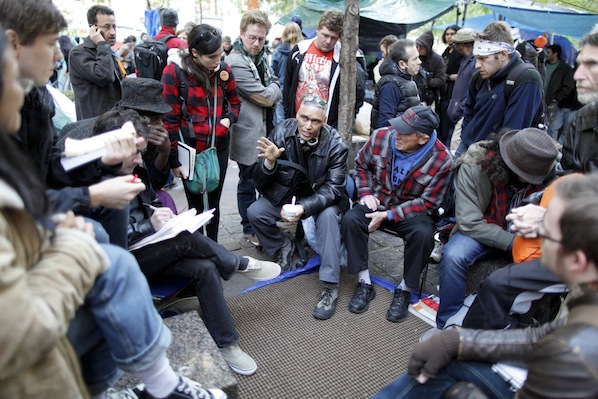
Photo by: Marc Fader
At a recent discussion, participants at Occupy Wall Street discussed socialism and capitalism.
Diversity has cut both ways for skeptics of Occupy Wall Street: The lack of ethnic diversity has been one reason to dismiss the people living in Zuccotti Park, while the presence of diverse messages has been another.
At least the first critique could be complicated by a March planned for Monday morning that, its organizers say, will be led by Black and Latino community members as it traces 11 miles from Washington Heights through Harlem on its way to the financial district.
At a Thursday press conference announcing the march, State Sen. Adriano Espaillat brushed off a question about whether the occupiers lack racial diversity. “We feel they speak for all Americans,” he said. Referring to low-income New York, he added: “We have been in a constant recession. These conditions are not new for us. Now, more people are keenly aware of it. We want to show solidarity.”
“We are so proud of the leaders of the protest,” said Ydanis Rodriguez, a City Council member. “It is up to the elected officials to work together to give more color to the movement.”
Common cause around taxation
It’s unclear what kind of crowd a Monday morning march will get (the New York City Marathon probably prevents a large event from taking place over the weekend) but Richard Espinal, who works at Centro Altagracia, a nearby Catholic social justice organization, says people in lower-income communities like Washington Heights are aware of what’s happening in Zuccotti Park and broadly supportive. They have not joined the event in large numbers, however. “It’s a challenge because people have to go to work, they don’t have the luxury to take a day off to go to a protest.”
In the crowd at the announcement was Carmen Perez. After speakers discussed the gap between the rich and poor, and the impact of budget cuts, as the reasons they felt in league with the occupiers, Perez said her reason for joining was improving education. Her son has graduated high school and is attending college, but the quality of education available to other people in her neighborhood concerns her. “If the wealthy and corporations will pay more taxes then there’d be more resources for our neighborhoods’ needs,” she said.
Indeed, those who claim OWS is ideologically unfocused seem to ignore the fact that progressive taxation—especially the Millionaire’s Tax—has widespread support among the occupiers. And it’s been a major bridge between the OWS activists and low-income advocacy groups.
“I think folks feel common cause but worry about the needs of the very low-income being left out of a big tent dialogue about the 99 percent,” says one veteran New York advocate for low-income people. “Still, people want to feed off one another and use this moment of open dialogue and shifted discourse to advance causes we’ve been fighting on for years, and perhaps be able to win more because the window is wide open.”
Multitude of slogans, common message
Near the sign-in table at the entrance to the Occupy Wall Street site, there’s a sloppy looking sign quoting Whitman. “I contain multitudes. Do I contradict myself? Then I contradict myself.”
It can be difficult to separate who are the occupiers and who are the onlookers at Zuccotti Park, but the people sitting in or among tents on Thursday afternoon were mostly, but far from exclusively, white.
There certainly were diverse opinions on display. A man holding a cardboard sign that read “Israel has 500 nuclear weapons” shouted that “Jews are responsible for most white-collar crime.” But others from the mainstream Occupy groups quietly talked over him, explaining that he does not represent the movement. There were signs demanding “End the Fed” and “U.S. Military Out of Everywhere,” as well as leaflets outlining concrete ways individual consumers could encourage major corporations to hire more veterans. One banner read “Say No to Chinese Communist Party,” but a small-print sign made specific suggestions for how to improve the fairness of student loans.
The bulk of opinion at the occupation is not nearly as scattered as the panoply of banners would suggest. “There’s a very specific tenor to everything here—economic justice and government accountability,” said Tyler Combelic. “People want to get Wall Street held accountable for what it did, reform government and the financial system.” Describing the occupation as a “clearinghouse” for ideas, Combelic, a Brooklynite, added: “There’s constant discussion here about what system could be put in place to benefit accountability and democratic participation.”
Not all the answers
Nearby a small sign asked, “What will become of you if you stand by and do nothing in the face of evil?”
Paul Armstrong, an iron worker from Los Angeles in the city to do a job, said he came to Zuccotti to help get corporate and private money out of our election system. “Maybe we’d have a domino effect of things getting better after that,” he adds. “I don’t know what the answers are, I really don’t. That’s why I leave it to more intelligent men than myself. But I know we can’t stay on the course we’re on.”
Down the block from Armstrong, another man held a sign that read “New York Needs a Living Wage.” Above the Whitman quote was a placard that explained: “This is not a protest. This is an affirmation of the vitality and idealism erupting from underneath the present American nightmare.”








